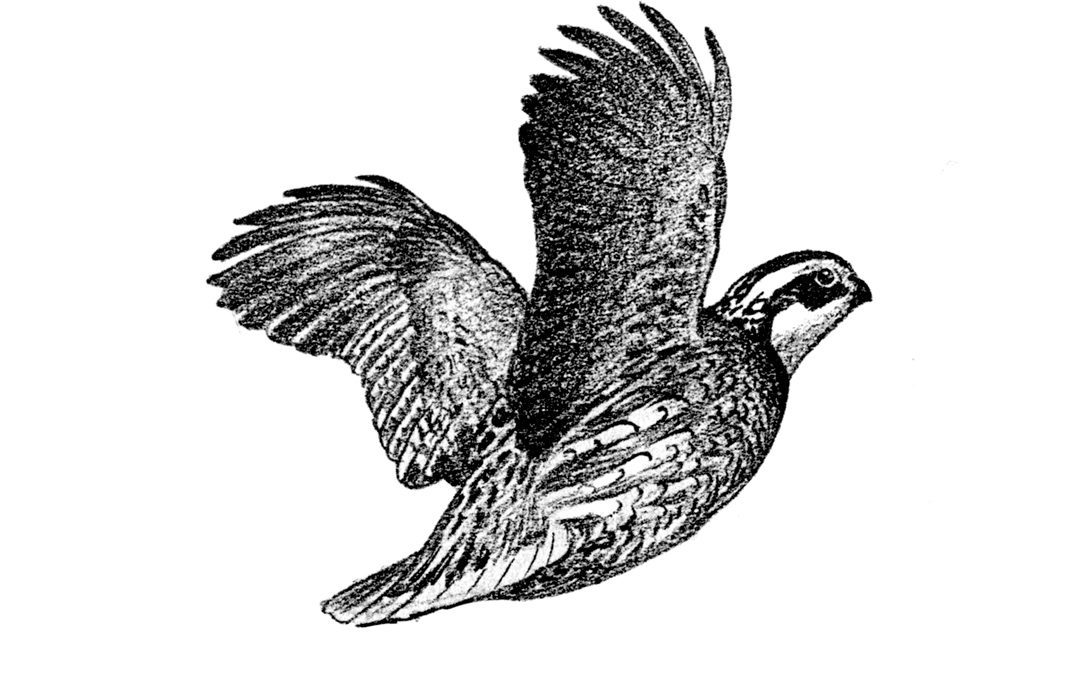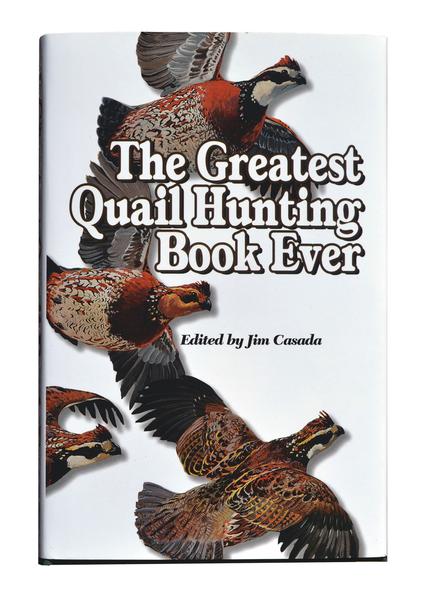“Bob White” Shrill and clear, from thicket near,
A song within the woodland ringing,
A treble note from silver throat
The siren of the fields is singing—
“Bob White! Bob White!”
And from the height, an answer sweet
Floats gently o’er the rippling wheat—
“Bob White! Bob White!”
O Song of Youth! Of Trust and Truth!
Of mellow days forever dying,
Still through the years, my sad heart hears
Your tender cadence—sighing—sighing—
“Bob White! Bob White!”
And far across life’s troubled ways
The echo comes from boyhood’s days—
“Bob White! Bob White!”
– Marion Franklin Ham
Gunners who relish searching for Bob White have doubtless absorbed unnumbered benefits from contact with the revelations and dispensations of nature. Evidence of such benign influence asserts itself from the very cradle of the sport. Age-spotted gun diaries reveal profound thoughtfulness among certain shooting gentry in jotting down seasonal impressions of the family life, table manners, and range characteristics of Colinus virginianus.
Treasured prints depict top-hatted and velveteened forebears squinting at proper gunplay behind clean-limbed dogs. Bloodlines, reiterated from obscure hunting strains, are vouched for by today’s high breeding in setters and pointers. On occasional manor walls and above sequestered plantation hearthstones hang rare flintlocks and powder horns dedicated to outmaneuvering Bob’s erratic departures. Many a percussion smoothbore, somnolent in attic rust, is linked in honor to booming yesteryears amid golden sedge and whirring wings. Final verdict is returned, however, in deeply underlying national affection and respect for Bob White as “a fellow of infinite sporting zest.”
Among understanding sportsmen, the esprit de corps of quail shooting demands unerring fairness to the bird. The hunt itself should be approached in a frame of mind aloof from mere heft of the game bag. Frankly, however, I do not agree with pseudo-idealistic blurbings which sigh that starry-eyed straying through scented countrysides is ample reward for a birdless gunner. If one’s mind is receptive to the beauties of frosted pumpkins and vivid sunsets beyond purpling ridges, so much the better. But any hard-going, intelligent shot has a right to fruitful field expectancy. In a vast majority of us lurks an urge for action, an ear for trigger music, and a nose for skillet savor. When those blessings are decently earned, good luck and amen! Let us say, then, that the law has cleared nature’s decks for action. Vernal matings have ripened into strong bevies along many familiar ranges. Beyond wait canvas-coated hosts and eager dogs.
Some days, quail can be found ad lib. At other times, the widest casts of your keenest-nosed dogs fail to strike pay dirt. Many factors are responsible for this raid upon the alibi treasury. In field lingo, your dogs may not “have their noses.” In that of science, and correctly, too, ground temperatures and air currents have them, instead. Warm weather, fatigue, frozen ground, diffused scent particles, or other ills to which dumb dog flesh is heir may have a bad hand. When such happens, make the best of it. Or tie up your quail dogs and turn loose the rabbit hounds.
Through ill luck, good bird range is sometimes barely missed. At others, bad judgment selects or steers a wrong route. Or another shooting party may have slipped in just ahead of yours. Distant gun reports and scattered single-bird finds tell that story. Yet most hunts are over reasonably familiar territories with bevy range reasonably well known. Even then, at times, the curse holds. Again, on unseasonable days, birds are raised apparently for the asking, and from most unexpected covers. By all the laws of the quail prophets they should have been elsewhere. I have even flushed them 30 yards in the wake of a disc plow, widely scattered and feeding peacefully among the hollows of upturned earth.
But before entering unfamiliar territory, the experienced quailer “reads sign” of sky and wind, terrain and water. Bird country, appearing prime to the novice, may analyze arid to seasoned field reasoning. Waves of glistening sedge and acres of matted weeds may size up beautiful but barren, with agrarian outskirts of adjacent planted country getting the call. Steady food supplies and coverts affording quick protection from feathered air raiders are what attract Bob White.
Walking or mounted, the experienced “pottige” hunter’s eyes rove the ground for vermin spoors. Comparatively fresh or faded empty shotgun shells are clues to prior invasions. Feathers, scratchings, droppings, and vocal rejoinders from wood and fields have meanings all their own. Sandy creek bottoms and moist ditch beds reveal telltale tracks. Overly numerous hawks and owls indicate game country. Many a knowing hunter has some sentinel air inspector to thank for a bevy find.
For instance, Hal and I had followed some singles over a hill into a brambled gully. Arriving first, Hal found Bill dog on point. From the ridge, I saw the whole occurrence. A hundred yards below Hal, a big hawk swooped suddenly in, hovered over the thicket fringe, and struck. Ten seconds later, he was flapping upwind with a fat quail dangling. Standing like a statue, Hal let Mr. Hawk beat slowly toward him and, at 30 yards, broke his neck. Alert to a tense situation, he whirled and dropped the flush off Bill’s point. Barring a missing head, the robber bird’s victim was quite intact. With a chuckle about killing two birds with one stone, Hal then attempted to broad jump a wide sand ditch, and missed.
So then, a quail shoot’s scope embraces luck, or lack of it, in judging and selecting routes; dog work and handling, good, bad, or indifferent; personal equipment, proper or unsuitable; and actual gunnery, effective or disappointing. Three methods of contact are in vogue. Old-fashioned, all-day “hoofing it”; horse- or mule-back; and via automobile.
The last named is sinister evidence of gasoline’s menace to off-the-road game resources. In skillful hands, a light car penetrates unbelievably remote places. An hour’s horse travel means 15 minutes with gas. If quick finds fail to materialize, the gang chugs off to more distant but fresher fields.
Read the rest of “Amid Whirring Wings” along with 37 other stories in “The Greatest Quail Hunting Book Ever” edited by Jim Casada. See this and other great Christmas gift ideas at sportingclassics.com/store.


